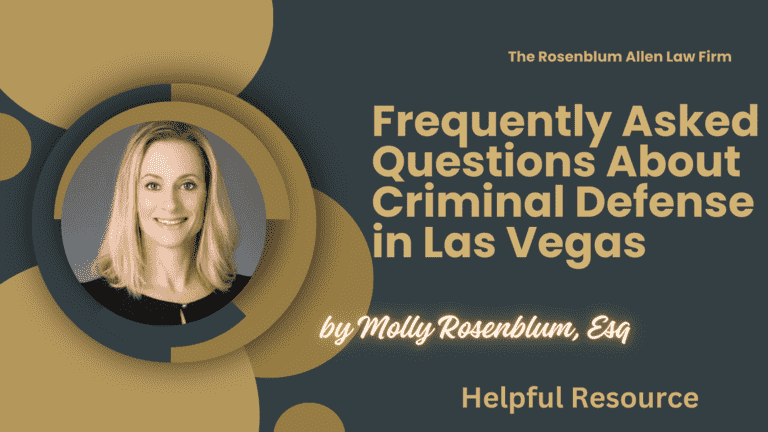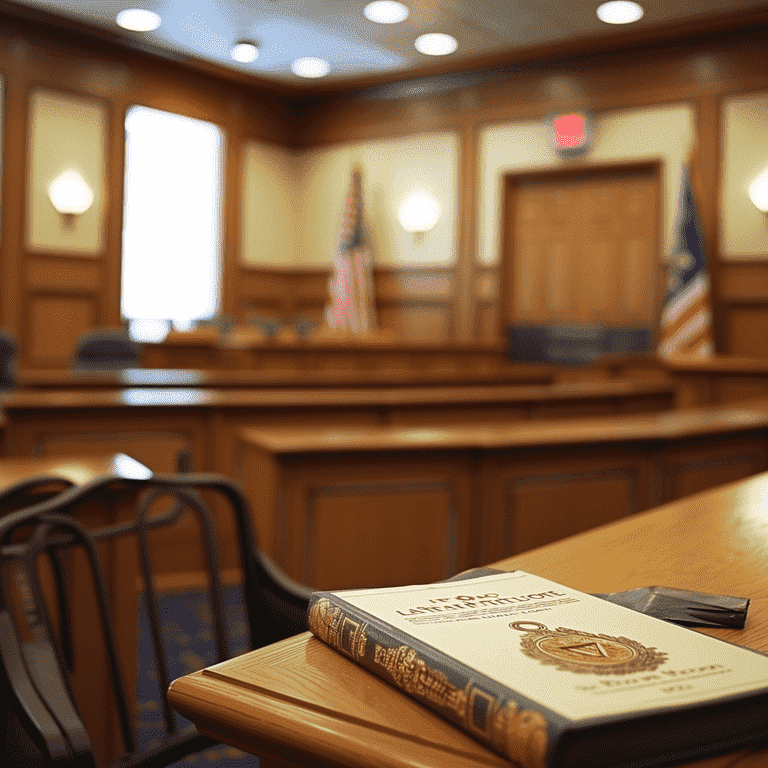Welcome to our guide on the critical aspects of criminal defense in Las Vegas. We’re here to provide clear and comprehensive information.

Understanding Criminal Defense in Las Vegas
What is Criminal Defense?
Criminal defense is more than just legal representation in court. It’s about understanding your rights. It’s about understanding the charges against you. It’s about finding the best strategies for your case.
Definition and Scope
At its core, criminal defense protects the rights of individuals accused of crimes. It encompasses everything from legal advice to representing clients in court.
Las Vegas Criminal Law Overview
Las Vegas, vibrant and bustling, has its unique set of laws and legal procedures. Knowing these can be crucial for anyone involved in the legal system here.
Nevada State Laws vs. Federal Laws
Las Vegas operates under both Nevada state laws and federal laws. The two can differ significantly. So, it’s essential to understand which laws apply to your case.
Types of Criminal Charges in Las Vegas
Misdemeanors vs. Felonies
In Las Vegas, criminal charges are mainly divided into misdemeanors and felonies. The distinction is crucial, affecting everything from potential penalties to trial procedures.
Examples and Differences
Misdemeanors are less severe offenses, like petty theft or minor traffic violations. They usually result in fines or short jail terms.
Felonies: More serious crimes, such as robbery or murder, are felonies. They carry heavier penalties, including longer prison sentences.
Specific Crimes Commonly Faced in Las Vegas
Las Vegas sees a variety of crimes, but some are more common due to its unique environment.
DUI, Theft, Assault
DUI (Driving Under the Influence): DUI charges are frequent given the vibrant nightlife.
Theft: From shoplifting to more elaborate schemes, theft charges vary widely.
Both simple and aggravated assault cases are common in areas with high nightlife activity.
Selecting a Defense Attorney in Las Vegas
Qualities to Look for in a Defense Attorney
Choosing the right defense attorney is crucial. It would help if you had someone who not only understands the law but also understands Las Vegas.
Experience, Expertise, and Local Knowledge
Experience: Look for a lawyer with a track record in criminal defense.
Expertise: Ensure they have specific knowledge relevant to your charges.
Local knowledge can be a game-changer. Being familiar with Las Vegas courts and law enforcement is important.
The Process of Hiring a Defense Attorney
Hiring a defense attorney shouldn’t be a daunting task. Knowing the process helps ease your mind.
Consultation, Retainer, and Representation
At the consultation, you discuss your case and assess compatibility. This is usually the first meeting.
Retainer: If you proceed, you’ll sign a retainer agreement outlining fees and services.
From here, your attorney will start working on your case. They will offer advice and represent you in court.
This section covers the basics of criminal defense in Las Vegas. It also covers the types of charges commonly faced and how to select the right attorney. Stay tuned for more in-depth information on the criminal defense process, your rights, and other essential topics. We’ll cover these in the following sections.

The Criminal Defense Process in Las Vegas
Initial Arrest and Charges
The moment of arrest can be overwhelming. Understanding the process helps keep you grounded.
What to Expect and Immediate Steps
What to Expect: Police will inform you of your charges and rights.
Immediate Steps: It’s crucial to remain calm, comply with basic requests, and avoid making statements without an attorney present.
Navigating Pre-Trial Procedures
Before the trial, there are several vital stages you’ll go through. Each step is critical to the overall defense strategy.
Bail, Arraignment, and Plea Bargains
Bail: A court process to determine if you can be released from custody before the trial.
Arraignment: Your first court appearance, where charges are formally read.
Plea Bargains: Sometimes, your attorney might negotiate a deal with the prosecutor to resolve the case without a trial.
The Trial Process
The trial is a pivotal part of your defense. Here, the prosecution and defense present their cases to a jury or judge.
Jury Selection, Evidence Presentation, and Verdict
Jury Selection: Choosing impartial jurors to hear your case.
Evidence Presentation: Both sides present evidence and question witnesses.
Verdict: The jury or judge delivers a decision based on the evidence.
Post-Trial Matters
The journey might not end with the trial. There are several post-trial aspects to consider.
Sentencing, Appeals, and Record Sealing
Sentencing: If convicted, the court will determine your sentence.
Appeals: You have the right to appeal the court’s decision.
Record Sealing: In some cases, you can apply to have your criminal record sealed.
Your Rights as a Defendant in Las Vegas
Constitutional Rights
As a defendant, you’re protected by various constitutional rights. These rights ensure fairness and due process.
Right to an Attorney, Right to a Fair Trial
Right to an Attorney: You’re entitled to legal representation.
Right to a Fair Trial: This includes a jury of your peers, a neutral judge, and the opportunity to present your case.
Protecting Your Rights
Knowing how to protect your rights is crucial in any legal situation.
Interaction with Law Enforcement and Legal Representation
Interaction with Law Enforcement: Always be polite but cautious about what you say.
Legal Representation: Rely on your attorney to speak and act on your behalf.
Costs and Financial Considerations
Understanding Attorney Fees
Legal representation comes with costs, and it’s essential to understand these upfront.
Hourly Rates, Flat Fees, and Contingencies
Hourly Rates: Some attorneys charge by the hour.
Flat Fees: Others offer a flat rate for the entire case.
Contingencies: These are rare in criminal defense but may apply in certain civil aspects linked to your case.
Additional Legal Costs
Beyond attorney fees, there are other costs to consider.
Court Fees, Fines, and Bail
Court Fees: These can include filing fees and other court-related charges.
Fines: If convicted, you might be required to pay fines.
Bail: If bail is set and you choose to pay it, this cost is often significant.
This section covers the crucial stages of the criminal defense process. It also explains your rights as a defendant. It also discusses the financial considerations involved in navigating the legal system in Las Vegas. Understanding these elements is critical to preparing for what lies ahead in your legal journey.

Common Misconceptions About Criminal Defense
Navigating the legal system can be confusing, and myths abound. Let’s set the record straight.
Debunking Myths
Understanding the truth behind these common misconceptions can greatly impact your approach to defense.
“I Can Represent Myself,” “The Case Will Be Dropped Easily”
Self-representation: While it’s your right, legal matters are often complex, requiring specialized knowledge.
Case Dismissal: Don’t assume your case will be dismissed without a thorough defense; every charge deserves serious attention.
Resources and Support in Las Vegas
Navigating the legal system can be daunting, but you’re not alone. Las Vegas offers various resources and support systems.
Legal Aid and Public Defender’s Office
Not everyone can afford private legal representation. However, that doesn’t mean you’re without options.
Availability and Eligibility
Legal Aid: Free or low-cost legal services for those who qualify.
Public Defender’s Office: If you cannot afford an attorney, the court may appoint a public defender.
Community Resources
Beyond legal help, community support plays a crucial role in your journey.
Support Groups, Educational Programs
Support Groups: Connect with others who have gone through similar experiences.
Educational Programs: Learn about your rights and the legal process.
Why You Have Not Hired a Felony Defense Attorney Yet
Watch this short video to take the next big step toward defending your rights against a felony charge.

Breaking It All Down for You
We’ve covered a wide range of topics in this guide. We’ve debunked common misconceptions. We’ve also explored the resources available in Las Vegas for those facing criminal charges. We aim to provide you with a clear understanding of the criminal defense process. We also answered the most frequently asked questions . We help you navigate these challenging times with confidence.

Frequently Asked Questions
What should I do if I’m arrested for a crime I didn’t commit in Las Vegas?
Stay calm, exercise your right to remain silent, and request a lawyer. Cooperate with booking, but don’t discuss your case or agree to searches without legal counsel. An arrest doesn’t equal guilt, and a skilled attorney can protect your rights.
How can I find an affordable criminal defense attorney in Las Vegas?
If you can’t afford an attorney, you may qualify for a public defender. Some private attorneys offer payment plans, sliding-scale fees, or pro bono work. Contact local legal aid clinics for referrals to affordable or free legal services.
What are the long-term consequences of a criminal record in Las Vegas?
A criminal record can impact employment, housing, education, professional licensing, travel, voting rights, and government assistance eligibility. Some convictions may be sealed or expunged to minimize long-term impact. Consult an attorney to understand specific consequences and options.
What happens during the initial consultation with a defense attorney?
The attorney will ask about your case details, criminal history, and explain your rights, potential defenses, and likely outcomes. They’ll discuss fees and payment options. Use this time to ask questions, voice concerns, and determine if the attorney is a good fit.
How can I protect my rights during a police encounter?
Remain calm and polite. You have the right to remain silent and can refuse searches without a warrant or probable cause. If arrested, request a lawyer immediately and avoid discussing your case with anyone else.
What are common criminal defense strategies in Las Vegas?
Strategies vary but may include challenging the legality of the arrest or search, disputing evidence or witnesses, presenting alibis, negotiating plea bargains, or seeking alternative sentencing. Your attorney will determine the best approach based on your case facts.
How can I support a loved one facing criminal charges?
Offer emotional support, help research attorneys, attend consultations if requested, assist with gathering evidence or character references, and keep in touch if they’re incarcerated. Be cautious about discussing their case with others. Take care of your own well-being too.
What’s the difference between misdemeanors and felonies in Las Vegas?
Misdemeanors (e.g., petty theft) carry up to one year in jail and/or fines. Felonies (e.g., murder) carry one year or more in prison and/or higher fines, plus more severe long-term consequences. Classification depends on offense severity, criminal history, and aggravating factors.

Glossary
Arraignment: The first court appearance where a defendant is formally charged and asked to respond to the charges by entering a plea.
Bail: A set amount of money that acts as insurance between the court and the person in jail. Bail allows the accused to be released from jail with the understanding that they will return for their court dates.
Breathalyzer Test: A device used to measure the amount of alcohol in a driver’s breath, commonly used in DUI cases.
Defendant: An individual, company, or institution sued or accused in a court of law.
DUI (Driving Under the Influence): The act of operating a motor vehicle while impaired by alcohol or other drugs, including prescription medications, to a level that renders the driver incapable of operating a vehicle safely.
Felony: A serious crime, typically involving violence, regarded as more severe than a misdemeanor and usually punishable by imprisonment for more than one year or death.
Jury Selection: The process by which jurors are chosen to serve on a jury during a trial.
Misdemeanor: A non-indictable offense regarded as less severe than a felony, punishable by a fine, penalty, or imprisonment for less than a year.
Parole: The conditional release of a prisoner before the completion of their sentence on the promise of good behavior.
Plea Bargain: An agreement in a criminal case between the prosecutor and the defendant where the defendant agrees to plead guilty to a particular charge in return for some concession from the prosecutor.
Probation: A court-ordered period of correctional supervision in the community, generally as an alternative to imprisonment.
Public Defender: A lawyer employed at public expense in a criminal trial to represent a defendant who cannot afford legal assistance.
Record Sealing: The practice of sealing or, in some cases, destroying court records that would otherwise be publicly accessible as public records.
Sentencing: The declaration by a judge of the punishment assigned to a defendant found guilty of a crime.
This glossary aims to provide clear and concise definitions of key legal terms related to criminal defense in Las Vegas, enhancing understanding for readers unfamiliar with legal jargon.
Additional Resources for You

As part of our commitment to providing comprehensive legal support, our lead attorney, Molly Rosenblum Allen, Esq, has crafted a suite of informative resources. These materials are meticulously designed to guide you through various complexities you might encounter in the legal landscape. Here’s a reminder of the valuable resources available at your disposal:
- Double Jeopardy: Understand the nuances of legal protections against being tried twice for the same crime. Explore more.
- Hung Jury: Gain insights into what happens when a jury cannot reach a unanimous decision. Learn more.
- Circumstantial Evidence: Discover the role and impact of circumstantial evidence in legal proceedings. Read further.
- Indicted vs Charged: Clarify the distinction between being indicted and being charged, and what each means for your rights and your case. Find out more.
- Difference Between Jail and Prison: Understand the key differences between jail and prison, and how each relates to the legal process. Dive deeper.
- What are Miranda Rights: Get informed about your rights when being questioned or detained by law enforcement. Know your rights.
- How to Check if You Have an Outstanding Warrant: Learn the steps to determine if there is an outstanding warrant in your name. Check here.
- What to Look for in a Criminal Defense Lawyer: Find guidance on selecting a proficient and reliable criminal defense lawyer. Choose wisely.
- Possible Ways to Reduce a Felony Charge: Explore strategies that might be employed to mitigate the severity of a felony charge. Explore options.
- Should You Accept a Plea Bargain: Delve into the considerations and potential ramifications of accepting a plea bargain. Make informed decisions.
These resources, thoughtfully curated by Molly Rosenblum Allen, Esq, are designed to empower and educate you, ensuring you’re well-prepared for any legal challenges you may face.

Offsite Resources You May Find Helpful
Here are several offsite resources related to criminal defense and legal assistance that you may find useful. Each of these resources provides a wealth of information and can be a valuable asset in your legal research:
American Bar Association: A prominent organization offering resources on various legal topics, including criminal defense.
National Association of Criminal Defense Lawyers (NACDL): This association focuses on criminal defense law and provides resources for legal professionals and the public.
FindLaw: A comprehensive resource for legal information, including detailed articles on criminal law and defense strategies.
Justia: Offers a wide range of legal resources, including case law, statutes, and information on different areas of law.
Avvo: Provides free legal advice, an extensive directory of lawyers, and articles on various legal topics.
NOLO: Specializes in legal information for consumers and small businesses, offering articles and guides on criminal law.
National Legal Aid & Defender Association (NLADA): This association is dedicated to providing legal support and resources, particularly for those who cannot afford legal representation.
Each of these websites offers a unique perspective and depth of information that can be extremely helpful for anyone looking to understand more about criminal defense and the legal system.

A Special Message From Our Lead Attorney
Why You Might Need a Lawyer

Molly Rosenblum, Esq
Dear Reader,
Thank you for exploring our comprehensive resources on criminal defense in Las Vegas. We hope that the information provided has been insightful and helpful in understanding the complexities of the legal system and your rights.
At The Rosenblum Allen Law Firm, we understand that facing criminal charges can be daunting. It’s an experience filled with uncertainty and stress. Our goal is to provide information, support, and effective legal representation.
I invite you to schedule a free consultation with our team to assist you further. This will help us discuss your specific situation. We can address any concerns you have and explore how we can best assist you in your legal journey.
Please call us at (702) 433-2889 to arrange your consultation. We’re here to help guide you through every step of the process. We’ll do it with professionalism and empathy.
We are looking forward to speaking with you and offering our support.
Warm regards,
Molly Rosenblum, Esq.








